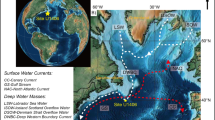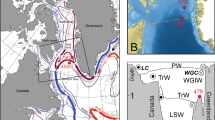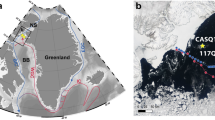Abstract
Pulsations in the production of North Atlantic deep water (NADW) have been implicated in generating drastic climatic fluctuations during the Glacial–Holocene (G/H) transition1–3. The stable isotope record of benthic foraminifera in high-resolution cores from the Norwegian Sea suggests that such pulsations did occur4. Although the question of exact timing (and mechanism) is still open there is little doubt that NADW pulsations were important in climatic history because the rate of NADW production influences the rate of advection of heat to the northern North Atlantic5. Here we report that a sporadic shutdown of NADW may be recognizable in deep-sea carbonates with normal (low) sedimentation rates. Hence the possibility arises that relatively short-lived events (∼1,000–2,000 yr) in deep circulation can be mapped over large areas of the sea floor, despite the detrimental effects of bioturbation on signal resolution.
This is a preview of subscription content, access via your institution
Access options
Subscribe to this journal
Receive 51 print issues and online access
$199.00 per year
only $3.90 per issue
Buy this article
- Purchase on Springer Link
- Instant access to full article PDF
Prices may be subject to local taxes which are calculated during checkout
Similar content being viewed by others
References
Olausson, E. Progr. Oceanogr. 3, 221–252 (1965).
Berger, W. H. & Killingley, J. S. J. mar. Res. 40, 27–38 (1982).
Broecker, W. S., Peteet, D. M. & Rind, D. Nature 315, 21–26 (1985).
Jansen, E., & Erlenkeuser, H. Palaeogeogr. Palaeoclimatol. Palaeoecol. 49, 189–206 (1985).
Berger, W. H., & Labeyrie, L. (eds) Abrupt climatic change—evidence and implications (Reidel, Dordrecht, in the press).
Vincent, E., Killingley, J. S. & Berger, W. H. Palaeogeogr. Palaeoclimatol. Palaeoecol. 33, 221–230 (1981).
Berger, W. H. & Killingley, J. S. Mar. Geol. 45, 93–125 (1982).
Berger, W. H., Killingley, J. S., Metzler, C. V. & Vincent, E. Quat. Res. 23, 258–271 (1985).
Mantyla, A. W. & Reid, J. L. Deep-Sea Res. 30, 805–833 (1983).
Vincent, E., Killingley, J. S. & Berger, W. H. Nature 289, 639–643 (1981).
Berger, W. H. & Vincent, E. Geol. Rdsch. 75/1, 249–269 (1986).
Woodruff, F., Savin, S. M. & Douglas, R. G. Mar. Micropaleont. 5, 3–11 (1980).
Belanger, P. E., Curry, W. B. & Matthews, R. K. Palaeogeogr. Palaeoclimatol. Palaeoecol. 33, 205–220 (1981).
Graham, D. W., Corliss, B. H., Bender, M. L. & Keigwin, L. D. Mar. Micropaleont. 6, 483–497 (1981).
Duplessy, J. -C. et al. Quat. Res. 21, 225–234 (1984).
Corliss, B. Nature 314, 435–438 (1985).
Berger, W. H. & Killingley, J. S. Science 197, 563–566 (1977).
Berger, W. H., Killingley, J. S. & Vincent, E. Nature 314, 156–158 (1985).
Mangerud, J., Andersen, S. T., Berglund, B. E. & Bonner, J. J. Boreas 3, 109–128 (1974).
Shackleton, N. J. & Opdyke, N. D. Quat. Res. 3, 39–55 (1973).
Kroopnick, P. M. Deep-Sea Res. A32, 57–84 (1985).
Weyl, P. K. Met. Monogr. 8, 37–62 (1968).
Duplessy, J. -C., Chenouard, L. & Vila, F. Science 188, 1208–1209 (1975).
Streeter, S. S. & Shackleton, N. J. Science 203, 168–170 (1979).
Boyle, E. A. & Keigwin, L. D. Science 218, 784–787 (1982).
Shackleton, N. J., Imbrie, J. & Hall, M. A. Earth planet. Sci. Lett. 65, 233–244 (1983).
Shackleton, N. J. Eos 66, 292 (1985).
Gordon, A. L. Science 227, 1030–1033 (1985).
Vincent, E. Mar. Biol. 9, 1–235 (1976).
Prell, W. L. & Hutson, W. H. Science 206, 454–456 (1979).
Shackleton, N. in The Fate of Fossil Fuel CO2 in the Oceans, 401–427 (Plenum, New York, 1977).
Ruddiman, W. F. & McIntyre, A. Palaeogeogr. Palaeoclimatol. Palaeoecol. 35, 145–214 (1981).
Ruddiman, W. F. & McIntyre, A. Quat. Res. 16, 125–134 (1981).
Mix, A. C. & Ruddiman, W. F. Quat. Sci. Rev. 4, 59–108 (1985).
Author information
Authors and Affiliations
Rights and permissions
About this article
Cite this article
Berger, W., Vincent, E. Sporadic shutdown of North Atlantic deep water production during the Glacial–Holocene transition?. Nature 324, 53–55 (1986). https://doi.org/10.1038/324053a0
Received:
Accepted:
Issue Date:
DOI: https://doi.org/10.1038/324053a0
This article is cited by
-
Evolutionary prospection in the Neogene planktic foraminifer Globorotalia menardii and related forms from ODP Hole 925B (Ceara Rise, western tropical Atlantic): evidence for gradual evolution superimposed by long distance dispersal?
Swiss Journal of Palaeontology (2016)
-
Molecular record of secular sea surface temperature changes on 100-year timescales for glacial terminations I, II and IV
Nature (1992)
-
Evidence for two-step deglaciation and its impact on North Atlantic deep-water circulation
Nature (1990)
-
Rapid climatic change and the deep ocean
Climatic Change (1990)
-
Internal secular variability in an ocean general circulation model
Climate Dynamics (1990)
Comments
By submitting a comment you agree to abide by our Terms and Community Guidelines. If you find something abusive or that does not comply with our terms or guidelines please flag it as inappropriate.



